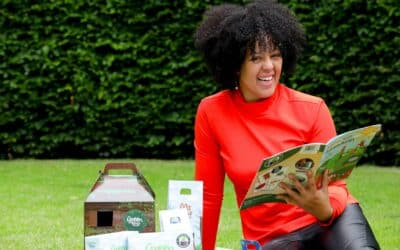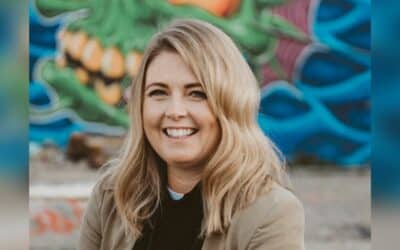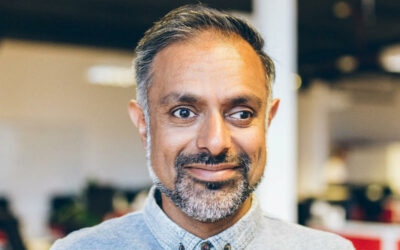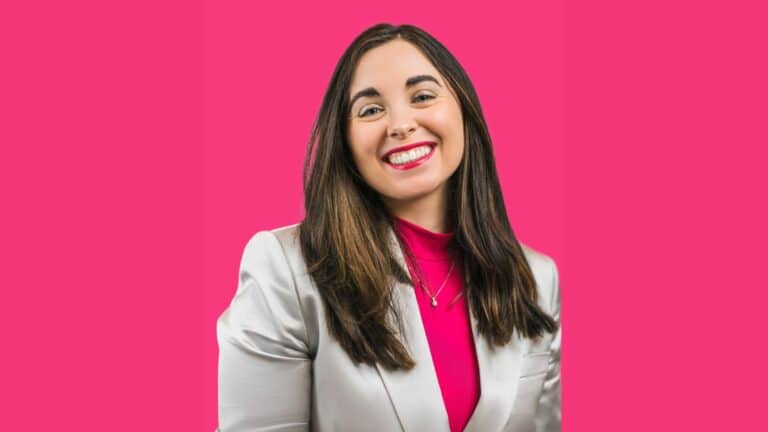Caroline Canty has worked in the digital and tech sectors for over 10 years, working across sales, marketing and branding.
In 2020, she decided to combine her knowledge about how to sell and market digital services with her love of coaching and mentoring and launched Craft Coaching.
She offers coaching and consultancy services to a range of tech and digital businesses, such as launching a B2B app with MyBuzz Technologies and building a marketing team from scratch with 6B.
Canty also appeared at this year’s Digital City Festival alongside Emma-Louise Fusari, founder and clinical director at In-House Health, hosting an interactive workshop that explored the impact of stress on innovation.
Here, she shares all the lessons she’s learnt in life and in her own career journey.
Which single daily habit or practice could you not do without?
My morning reflection time – I grab a coffee and just take 15 minutes before the emails and calls take over the day. Being a business owner, you have to wear a lot of hats, so it’s often the case before I even start work that I’ve got to-do lists and ideas floating around in my head. Taking that time first thing in the morning to give all those thoughts an outlet, get them onto paper and take a look at them with a more critical eye can really make the difference to how productive I am for the rest of the day. It helps me prioritise, but it’s also like my brain’s taking a deep breath before getting stuck in.
What’s been your luckiest break?
It didn’t feel like a lucky break at the time, but something on reflection that I think was a huge turning point in my career was when I became a manager for the first time. As part of that promotion, I got access to a leadership coach who the senior team worked with. I’d never even heard of leadership coaching before – and it turns out it was a pivotal event in my life. It set off a chain reaction for me discovering this as a career that I love and setting up my own company to support tech businesses and their teams to grow.
What’s your best failure?
When I was around 25 I set up on my own as a freelance writer and started a blog called “How to be a Graduate”. It was a total, utter flop – the blog barely got any views, the writing jobs I took were drastically underpaid and I was left completely unfulfilled and feeling like an utter failure.
But that experience was the most important failure of my life – it made me realise all the things as a new business owner that I was missing. I didn’t know how to sell, how to create propositions, how to build a brilliant landing page – I knew how to be a good writer who cared about their audience, I didn’t know how to run a business. I then spent years learning everything about the commercial side of a business, determined to set up my own company again one day… and that’s exactly what I did. And while the blog might have been a failure, it planted the seed for a product I’m launching later this year.
What is the best investment you’ve ever made, either financial or time?
One of the reasons I became a coach myself was because of the difference it made to my own life, so personal development for myself, both in terms of time and money, has been a vital investment. Health coaching, business coaching, mindset coaching – I’ve spent thousands over the years… but if I had to track it back, the best investment of all was about £15 on The Chimp Paradox by Professor Steve Peters. This was the book that started off all of my personal development work, overcoming anxiety and even becoming a public speaker on the topics of mindset change and stress management. Not a bad return on investment!
Which podcast or book would you recommend others to read and why?
I always recommend the Chimp Paradox (as you can probably tell from that last answer!) because if you really take time to absorb it, the material can transform the way you interact with the world and everyone in it. But I’ll give you a couple more – you², and its sister book The Quantum Leap Strategy, both by Dr. Price Pritchett. These are fantastic (and short) reads if you’re looking to develop a high-performance mindset.
What one piece of advice would you give your 21-year-old self?
Don’t be so bloody afraid of failing in life – failing is the best bit. It’s where you learn the best lessons, understand what not to do again, and work out what “good” looks like, whether that’s professional or personal. Failure is inevitable, so you might as well reframe it to reflect what it really is: opportunity.
Who or what has had the single biggest influence on your working life?
The growth of the digital world has enabled me to have a job and a business that I couldn’t have even imagined when I left uni – when I trained as a journalist, the web journalism part of my degree was tiny and we were told it would “never be important” by tutors… that aged well!
Every job I’ve had since I left uni has been in the digital realm, and now, I’m able to help customers on the other side of the world and deliver workshops in multiple time zones. Plus, I never would have had access to some of the greatest business mentors and personal development coaches in the world without the growth of digital communities, podcasts and streaming.
I think it’s easy to take something like “easy access to information” for granted these days, but my working life and the freedom of it wouldn’t exist without the tech sector – which is one of the many reasons I’m so passionate about helping businesses to grow successfully as a part of it.
Tell us something about you that would surprise people.
I have a Master’s degree in archaeology and spent several weeks on digs when I was at the start of my career, trying to decide whether to be a writer or not. Turns out I made the right call!
How will the COVID crisis change work for the better?
I think COVID did three incredibly important things for the workplace: 1) It forced people to take a step back from what they were doing and really consider whether they enjoyed it 2) It acted as a catalyst for a lot of industries when it came to hybrid models of working and showed some that it IS possible after all 3) It re-set people’s expectations as to what they want from their employer.
All three of these had big implications for employers when it came to evaluating the health and wellbeing impact of today’s workplace on employees. We’ve seen a positive shift in terms of the emphasis being put on this since, and there are signs of greater investment – which is a good step in the right direction if we’re going to tackle the long-term issues of burnout and stress, especially in digital.
What does success look like to you?
From a personal standpoint, success with my work was always about achieving freedom. Freedom to pick the clients I worked with, to do a job I loved and to do it from wherever I wanted in terms of me being at my most productive – and this is something that’s a constant point of success for me to evaluate my company growth by.
From a business standpoint though, it’s all about creating sustainable tech sector growth – so the next point of success for me is launching my brand new employability coaching product towards the end of the year. I’m so excited to be able to take years and years of working on this to market, and help people at the start of their careers in digital. It can be a tough sector to adapt to because it’s so fast-paced. Sure, it’s innovative, but demanding. Knowing that I can help equip them for that is hugely important for me over the next 12 months.











